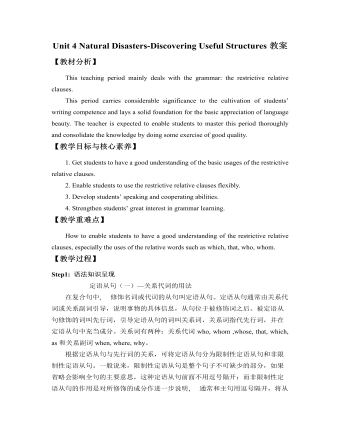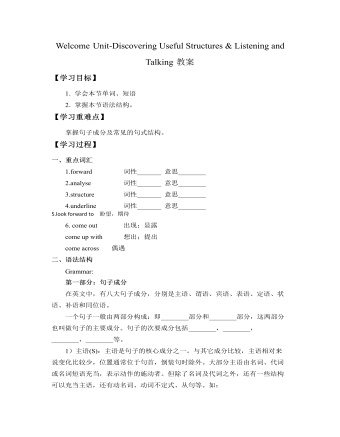新人教版高中英语必修1Unit 3 Sports and Fitness- Discovering Useful Structures—tag questions教案
-
- 页数:6页
- 字数:约 5166 字
- 大小:39.44KB
- 格式:.docx
- 版本:Office2016及以上版本
- 作者:Riordon设计
Unit 3 Sports and Fitness- Discovering Useful Structures—tag questions教案
【教材分析】
This teachingperiod mainly deals with the grammar: tag questions.
This periodcarries a considerable significance to the cultivation of students’ spokenEnglish. The teacher is expected to enable students to master this periodthoroughly and consolidate the knowledge by doing some exercise of goodquality.
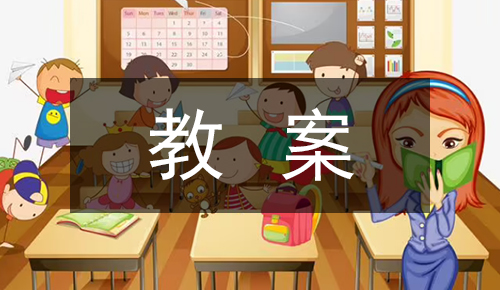
【教学目标与核心素养】
1. Get students to have a goodunderstanding of the basic usages of tag questions.
2. Enable students to use the basic phrasesstructures flexibly.
3. Develop students’ speaking andcooperating abilities.
4. Strengthen students’ great interest ingrammar learning.
【教学重难点】
1. How to enable students to have a goodunderstanding of the basic usages of tag questions.
2. How to enable students to use the basicusages of tag questions flexibly.
【教学过程】
Step1: 语法自主探究
一、基本组成方法
1.肯定式陈述部分+否定附加疑问部分(前肯后否)
You often play badminton, don’t you? 你经常打羽毛球,是吗?
You are going to the gym with me, aren’t you?
你要和我一起去健身房,是吗?
She’s been to shanghai before, hasn’t she? 她以前去过上海,是吗?
2.否定式陈述部分+肯定附加疑问部分(前否后肯)
It isnt a beautiful flower, is it? 那不是美丽的花,是吗?
You didnt go skating yesterday, did you? 你昨天没去滑冰,是吗?
They can’t finish it by Friday, can they?
他们不能在星期五之前完成,是吗?
3.含有否定词的附加疑问句
(1)当陈述句中含有seldom, hardly, never, rarely, little, few, none, neither ,no, not, nowhere, nothing no one, nobody等否定意义的词时,后面的附加疑问句则为肯定形式。
He hardly goes to school by car, does he?
他几乎不开车去上学,是吗?
You have never been to Paris, have you?
你从没去过巴黎,是吗?
They seldom come late, do they?
他们很少迟到,是吗?
Little has been done to prevent pollution, has it?
几乎没有做什么来防止污染,是吗?
(2)如果陈述句中仅含否定前缀的词unhappy, dislike, impossible等,则后面的附加疑问句仍为否定形式。
He is unfit for his job, isn’t he?
他不适合这项工作,是吗?
It is impossible, isnt it?
那不可能,是吗?
He dislikes his classmates, doesn’t he?
他不喜欢他的同学,是吗?
4.祈使句的附加疑问句
(1)肯定的祈使句的附加疑问句在句末加“will you? /won’t you?/can you ?/ can’t you?”
(2)否定的祈使句的附加疑问句通常在句末加“will you?”
Come along with me, will you / won’t you ?/can you ?/ can’t you?
跟我来,好吗?
Dont make any noise, will you?
别出声,好吗?
(1)Lets开头的祈使句,附加疑问句用shall we?
(2)Let us开头的祈使句,附加疑问句用will you?
Lets go and listen to the music, shall we?
让我们去听音乐,好吗?
Let us wait for you in the reading-room, will you? 我们在阅览室等你,好吗?
二、附加疑问句注意几种特殊情况:
1.当陈述部分主语是everyone/ everybody, someone/somebody, no one/ nobody, none等表示人的不定代词时,附加疑问句部分的主语多用they,但也可用he;当陈述部分的主语是everything, anything, something, nothing等表示物的不定代词时,附加疑问句部分的主语用it。
Nobody saw him walk into the room, did they?
没人看见他走进房间,是吗?
Everything has gone wrong today, hasn’t it?
今天什么都出了问题了,是不是?
2.当陈述部分的主语是指示代词this, that, these, those时,附加疑问句的主语不再用指示代词,而要用it或they。
That isn’t your dictionary, is it?
这不是你的字典,是吗?
These are interesting stories, aren’t they?
这些故事很有趣,不是吗?
3.当陈述部分是“there be+主语+其他”结构时,附加疑问句用“be (not) there”结构。
There is a book on the desk, isn’t there ?
桌子上有本书,是吗?
There are not any pens in the box, are there?
盒子里没笔了,是吗?
4.当陈述句的谓语动词是have时,如果作“有”讲,附加疑问句用have或助动词do的形式;如果表示其他意思时,附加疑问句只用助动词do的形式。
You have a nice house, haven’t/ don’t you?
你有一所很漂亮的房子,是吗?
You often have headaches, don’t you?
你经常头疼,是吗?
We have to finish the work now, don’t we?
我们必须现在完成工作,是吗?
They had a good time last night, didn’t they?
他们昨天晚上玩得很开心,是吗?
5.当陈述句的谓语部分含有had better, would rather, would like, ought to时,附加疑问句的谓语动词要用相应的助动词。
You’d better go now, hadn’t you?
你最好现在就走,是吗?
You’d rather go there early, wouldn’t you?
你宁可早点去那里,不是吗?
6.当陈述句的谓语动词含有used to时,附加疑问句的谓语部分用didn’t或usedn’t。
He used to get up early, didn’t/ usedn’t he?
他过去起床很早,是吗?
7.陈述句部分是主从复合句时,附加疑问句部分的代词和助动词要与主句中的主语和动词保持一致。
He is not the man who gave us a talk, is he?
他不是给我们演讲的人,是吗?
He can hardly stay awake because he is so tired, can he?
由于很累,他几乎不能保持醒着。
This is the second time that he has been to Japan, isn’t it?
这是他第二次去日本,是吗?
He said that he would come to my birthday party, didn’t he?
他说他要来参加我的生日聚会,是吗?
8.在宾语从句中,如果陈述句部分是“I (don’t) think/ believe/ suppose/ imagine/ expect等+宾语从句”,附加疑问句部分要与宾语从句的主谓保持一致,并且要注意否定转移(前肯后否,前否后肯)。
We believe she can do it better, cant she?
我们相信她能做得更好,是吗?
I don’t think you have heard of him before, have you?
我认为你以前没有听说过他,是吗?
三、附加疑问句的回答
附加疑问句的答语与一般疑问句类似,注意其与汉语表达习惯的差异。回答附加疑问句通常应根据实际情况来确定,如果事实是肯定的,就用yes,事实是否定的,就要用no。
1.附加疑问句的答语与汉语表达的差异:
(1)对于“前肯后否”的附加疑问句的回答,如果事实是肯定的,就用yes,译成“是的”,事实是否定的,就要用no,译成“不”。
(2)对于“前否后肯”的附加疑问句的回答,如果事实是肯定的,就用yes,译成“不”,事实是否定的,就要用no,译成“是的”。
— Tom is an honest boy, isnt he?
汤姆是个诚实的男孩,是吗?
— Yes, he is. We trust him all the time.
是的,我们一直相信他。
— He likes playing football, doesn’t he?
他喜欢踢足球,是吗?
— No, he doesn’t.
—不,他不喜欢。
— You didn’t find the owner of the books, did you? 你没有找到书的主人,是吗?
— No, I didn’t. So I gave them to our teacher.
是的,我没有找到。因此我把书交给老师了。
— His sister didn’t attend the meeting, did she?
他妹妹没有参加会议,是吗?
— Yes, she did. She spoke at the meeting.
不,她参加了。她在会上讲话了。
您可能喜欢的文档
查看更多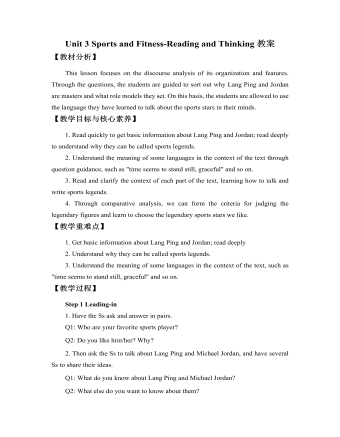
新人教版高中英语必修1Unit 3 Sports and Fitness-Reading and Thinking教案
- 页数:3页
- |大小:29.97KB

新人教版高中英语必修1Unit 3 Sports and Fitness-Reading for Writing教案
- 页数:3页
- |大小:32.97KB
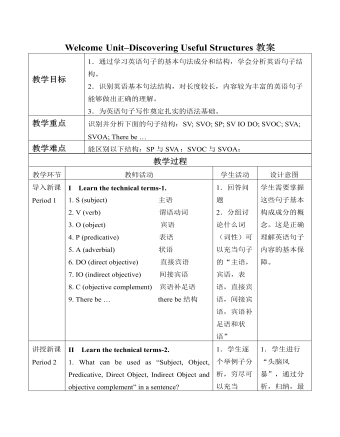
新人教版高中英语必修1Welcome Unit-Discovering Useful Structures教案
- 页数:11页
- |大小:82.15KB

新人教版高中英语必修2Unit 5 Music-Discovering Useful Structures教案二
- 页数:4页
- |大小:68.34KB

新人教版高中英语必修2Unit 5 Music-Discovering Useful Structures教案一
- 页数:4页
- |大小:76.03KB
热门课件教案
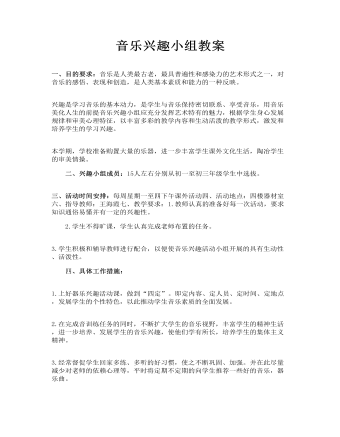
音乐兴趣小组教案
- 页数:5页
- |大小:89.58KB
- 课件教案
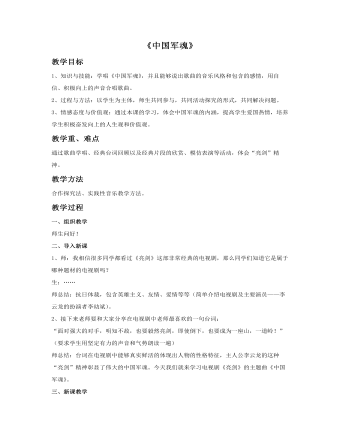
《中国军魂》教案
- 页数:2页
- |大小:33.00KB
- 课件教案
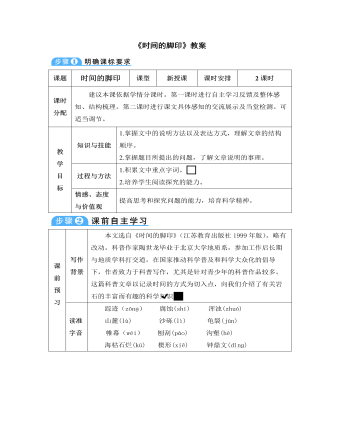
部编版语文八年级下册《时间的脚印》教案
- 页数:4页
- |大小:511.50KB
- 课件教案
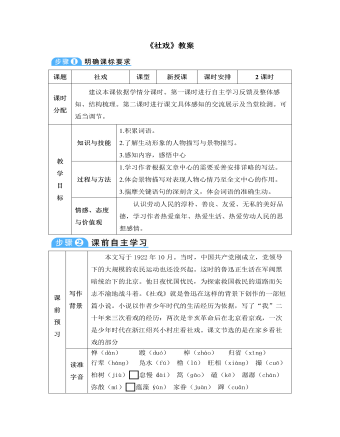
部编版语文八年级下册《社戏》教案
- 页数:8页
- |大小:340.00KB
- 课件教案

精选高中生期末评语
- 页数:42页
- |大小:7M
- 课件教案
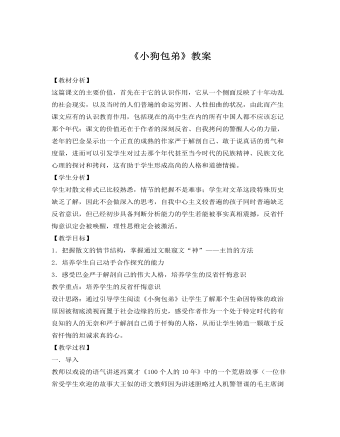
人教版高中语文《小狗包弟》教案
- 页数:8页
- |大小:29.21KB
- 课件教案
今日更新

精选高中生期末评语
- 页数:42页
- |大小:7M
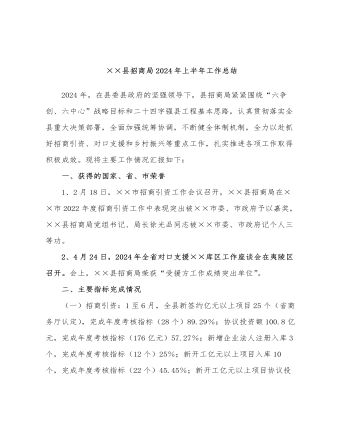
××县招商局2024年上半年工作总结
- 页数:12页
- |大小:142.54KB
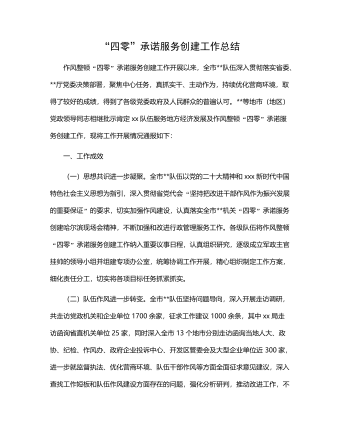
“四零”承诺服务创建工作总结
- 页数:5页
- |大小:39.83KB
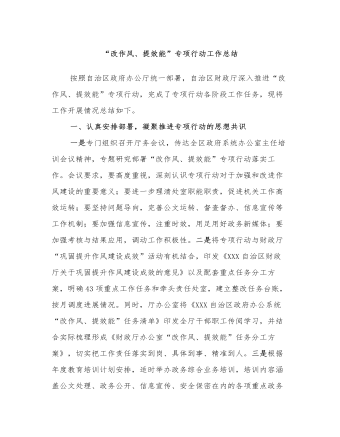
“改作风、提效能”专项行动工作总结
- 页数:6页
- |大小:139.05KB
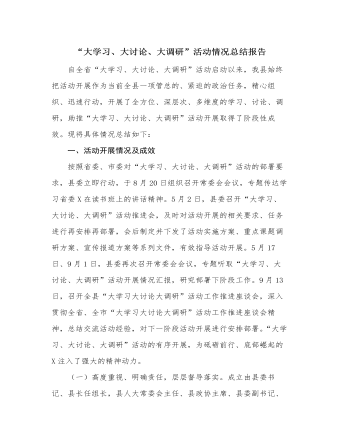
“大学习、大讨论、大调研”活动情况总结报告
- 页数:7页
- |大小:26.12KB
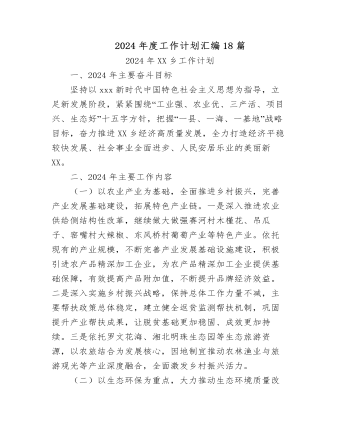
2024年度工作计划汇编(18篇)
- 页数:72页
- |大小:196.93KB
